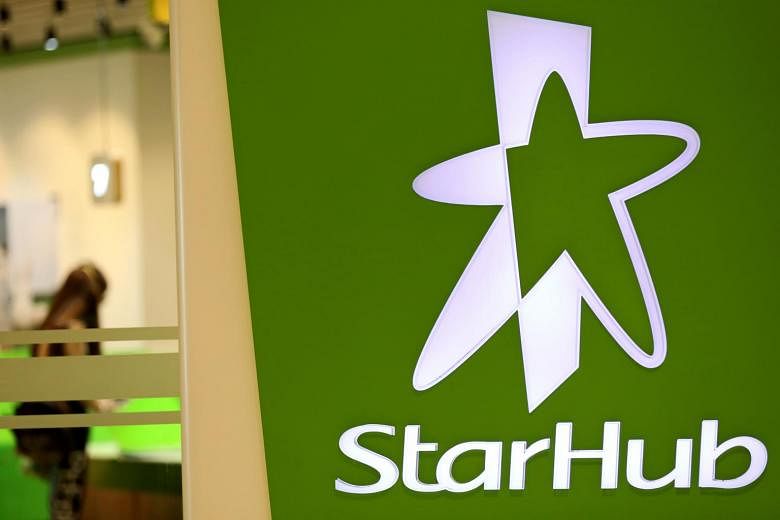SINGAPORE (THE BUSINESS TIMES) - StarHub's net profit fell 5.6 per cent to $37.3 million for the second quarter ended June 30, 2020, from $39.5 million in the year-ago period.
Meanwhile, the first-half dividend was nearly halved to 2.5 cents a share, from 4.5 cents before, with StarHub's full-year payout guidance also lowered.
This came as most of the group's retail stores were closed during Singapore's "circuit-breaker" period during the quarter, while its roaming, IDD and prepaid mobile revenues also took a hit from the steep decline in travel as a result of strict border controls instituted in late-March.
The telco said in results released on Friday morning that Q2 2020 was the first full financial quarter affected by the novel coronavirus pandemic.
Total revenue sank 18 per cent to $453.4 million for the three months, from $552.8 million in the corresponding period last year.
Service revenue slumped 15 per cent to $376.2 million. The telco said its revenues were dragged by lower contributions from mobile, pay TV, broadband and equipment sales.
Mobile service revenues shrank by 25.4 per cent. Postpaid mobile revenues fell due to lower IDD, excess data usage, lower roaming due to a significant drop in global travel caused by the Covid-19 outbreak, lower plan subscriptions and VAS (value-added services) revenues.
Postpaid average revenue per user (ARPU), a key industry metric, declined by 25 per cent year on year to $30, while the number of subscribers fell to 1.45 million, from 1.48 million before.
The dearth of inbound and outbound travel amid border control measures during the pandemic also weighed on prepaid mobile revenues.
StarHub's enterprise business was the only segment to post turnover growth, partly on higher contributions from data and Internet services, where the group booked one-off revenue from the delivery of data transmission equipment.
Revenue uplift also came from the loss-making but fast-expanding cybersecurity operations. This segment - which includes revenue from the pure-play Ensign InfoSecurity joint venture with Temasek Holdings - grew by 10.1 per cent amid higher business demand, even though operating losses widened.
StarHub said in its outlook statement that businesses are expected to continue investing in their network infrastructure as they adopt cloud services, which could help to mitigate pricing erosion in traditional telco connectivity service.
Charlie Chan, head of enterprise at StarHub, noted on an earnings call that the telco saw growth in the second quarter as the Covid-19 pandemic led to more telecommuting.
Group earnings per share stood at two cents for the quarter, down from 2.2 cents in Q2 2019.
Chief executive officer Peter Kaliaropoulos said in a statement that "the challenging environment and business conditions will likely sustain throughout 2020".
Travel restrictions have curbed consumer mobile revenue and the enterprise business faces tender delays and longer sales cycles, he noted.
All the same, the company was upbeat on its plans for 5G development, with growing interest in 5G solutions among the anticipated drivers for its enterprise business.
StarHub and M1 have jointly clinched a licence for a nationwide 5G network, with roll-out to start next year and each partner to individually offer commercial services from 2021.
The StarHub-M1 joint-venture company has been pitched as a standalone special-purpose vehicle, funded 85 per cent by debt and 15 per cent by equity, with all expenses and profits to be split equally between the two partners.
StarHub - which expects to make an initial capital investment of $200 million, front-loaded in H2 2020 and 2021 - said that it is tapering off its capex on legacy networks to the minimum required for regulatory obligations.
The capex savings will be redirected towards the 5G network, while more investments may also be made based on business demand.
For the first half of this year, net profit declined 17.2 per cent to $77.4 million, while total revenue dropped 16.5 per cent to $959.6 million. Service revenue for the six months was down 11.9 per cent to $781.1 million.
An interim dividend of 2.5 cents per share was recommended for the half year, to be paid on Sept 2 after books closure on Aug 19. In H1 2019, the interim dividend was 4.5 cents, comprising 2.25 cents declared for Q1 and Q2 each.
That would take the full-year dividend to at least five cents a share, compared with an annual payout of nine cents a share in FY2019, and 16 cents a share before that.
Still, the management reaffirmed its commitment to a dividend policy of paying out at least 80 per cent of net profit on a semi-annual basis.
The reduced interim dividend is "taking into account everything that's happened to us in the last six months, and the outlook", Mr Kaliaropoulos added on the earnings call.
For FY2020, StarHub on Friday said the group is expected to see a 10-12 per cent decline in service revenue due to uncertainties in consumer demand caused by Covid-19 measures.
"Due consideration has also been given to longer sales cycles, project and tender delays experienced by the enterprise business as a result of Covid-19," the telco added.
The group also expects to declare a final dividend for H2 2020 that is equal to or higher than the first-half's interim dividend of 2.5 cents per share.
Last week, StarHub announced that Mr Kaliaropoulos will step down for personal and family reasons on Oct 31. The company is carrying out a global search for his successor.
StarHub shares were trading higher by $0.02 or 1.6 per cent at $1.24 on a cum-dividend basis at 11am on Friday, after the results were released.

